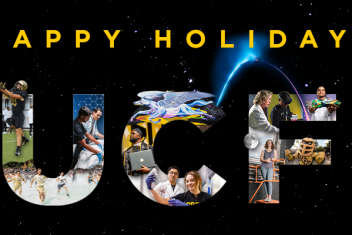Dear Faculty Colleagues:
All of our courses must be accessible and usable for every student. This is the right thing to do, and it is also a legal requirement.
The commitment to accessibility supports President Cartwright’s focus on building a university with inclusive excellence and a culture of compassion at the core. Student Accessibility Services works with over 2,500 students with known disabilities each semester in courses taught by 75 percent of our faculty.
Faculty members are responsible for creating accessible course content with sound pedagogical design for all students. The ultimate objective is to create inclusive learning experiences that are accessible from the outset, rather than rely on after-the-fact accommodations.
Some useful strategies include:
- only using videos that are properly captioned
- activating the auto-captioning feature for all Zoom courses (seek help if needed from Webcourses@UCF.Support)
- making PowerPoints available to all students before class sessions
- making lecture recordings and other content available to all students for review
- carefully considering the use pop quizzes, in-class quizzes and clicker quizzes (because providing accommodations for these creates a logistical challenge for faculty and hinders accessibility)
- linking attendance and participation grades to the core learning objectives (and only using them when truly necessary)
- using a variety of teaching styles and assessment measures throughout the course.
- building tests with multiple measurements (multiple-choice, short answer, essay, etc.)
- other strategies for inclusive course design
If you have questions about how to make your course accessible to all learners, please work with the Faculty Center for Teaching and Learning, the Center for Distributed Learning, and Student Accessibility Services. Specific resources from these offices are listed below.
Resources
The Faculty Center for Teaching and Learning (FCTL)
FCTL can support faculty members in designing inclusive course materials and teaching strategies that can benefit a wide range of differences among students. Such approaches can minimize the need for facilitating accommodations. The office offers workshops and one-on-one consultations with faculty on best practices. Contact the FCTL at 407-823-3544 or fctl@ucf.edu. Inclusive teaching tips and recommended accessibility syllabus statement are available below:
- Inclusive Teaching
- Designing with Accessibility in Mind
- Assignment Design
- Backward Design
- Recommended Course Accessibility Statement for Syllabus
Center for Distributed Learning (CDL)
The CDL offers professional development opportunities and assists faculty in designing and developing accessible materials for online/blended courses (i.e., W, M, V, and RS modalities). General inquiries should be directed to 407-823-4910 or cdl@ucf.edu. Faculty members credentialed to teach in online/blended modalities are encouraged to work directly with their assigned instructional designers to design inclusive and equitable learning experiences. The following resources are available to help all faculty make online course materials more accessible:
- Accessibility-Related Online Teaching Practices from the Teaching Online Pedagogical Repository (TOPR)
- Practical Faculty Examples: Provide Alternative Means of Access to Course Materials
- Online Accessibility Course Design Tips
- Universal Design Online Content Inspection Tool (UDOIT) checks your course for common accessibility concerns
- Quiz Extensions allows faculty to add extra time to Quizzes for accommodation requests
Student Accessibility Services (SAS)
SAS is a resource for faculty to support equal access within the classroom. SAS values faculty collaboration and partnership in addressing barriers in a course, including extended time on tests, captioned videos, classroom interpreting and captioning, and facilitation of course policy adjustments for students with chronic health conditions. Faculty are notified of necessary access considerations via a Course Accessibility Letter email from SAS. For more information, contact 407-823-2371 or sas@ucf.edu. Links below offer ideas on how to reduce the need for accommodations and about the general accommodation process.
- General Faculty Access and Accommodation Information
- Online Teaching and Access Guidance
- Video, Word and PowerPoint Accessibility Tips
- Accessible Courses by Design PDF with tips for inclusive design
- iClicker Accessibility Tips
- Pop Quiz Accessibility Tips
UCF is committed to inclusion. Designing courses with disability access in mind demonstrates inclusion in action.



